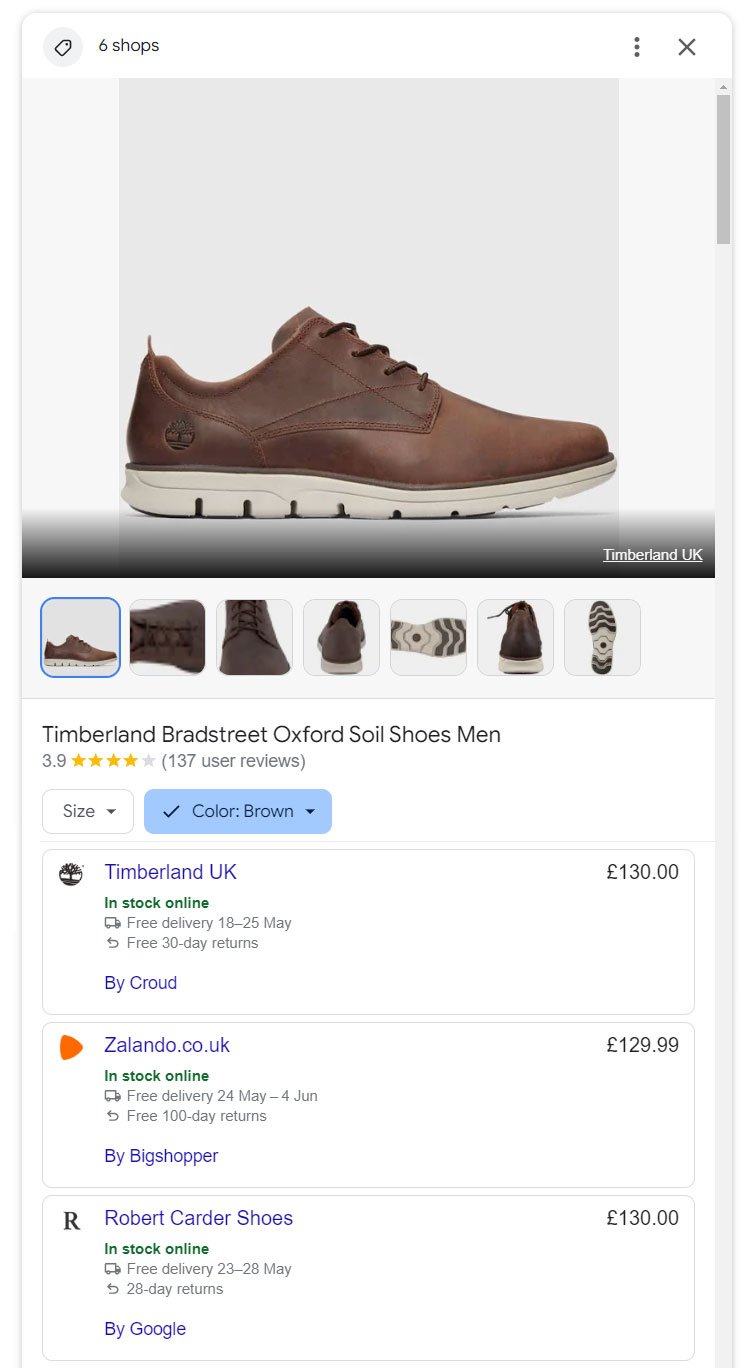
The increasing importance of Schema markup for Google product search results
When you add structured data to your product pages, that information can appear in richer ways in Google Search results (including Google Images and Google Lens). For example, users can see availability, price, shipping information, ratings, reviews and more right there in the search results
Google's recent enhancements to those product search results are set to streamline the consumer experience, allowing for effortless price comparison directly within search engine results pages. For instance, when searching for a generic product like "buy men’s brown shoes," users can now find a grid of visually appealing product boxes alongside the traditional search results. These boxes display key information such as product name, images, price, store name, average ratings, and review count. Unlike conventional organic results, clicking on these boxes directs users to shopping knowledge panels within the SERP, offering a convenient platform for comparing prices and product details without the need to navigate to individual ecommerce sites.

Example of product boxes on primary SERPs showing product name, image, price, store, rating and number of ratings.
While these changes offer consumers greater convenience, they pose new challenges for online retailers. The algorithm used by Google to rank these product tiles remains somewhat opaque, but it's clear that they are influenced by structured data such as Schema.org markup. To maintain visibility in these product grids and knowledge panels, ecommerce businesses must ensure their structured data is accurate and up-to-date. This shift underscores the importance of structured data in ecommerce SEO strategies, with recent updates from Google expanding support for product structured data to include new shipping and returns classes, as well as product variants like sizes, colours, and materials.
One notable feature of these shopping knowledge panels is the ability for users to sort and filter results by factors such as store name, size, colour, and more. This functionality empowers shoppers to refine their search results based on their preferences, and directs them straight to pre-selected product variants, when ready to purchase, smoothing their checkout journey. However, it also places additional pressure on ecommerce merchants to ensure their product information is comprehensive and accurate. Failure to do so risks being filtered out of search results by users seeking specific product variants.
The introduction of shopping knowledge panels also has implications for the role of landing pages in ecommerce websites. With many users bypassing individual product pages altogether in favour of these panels, the importance of unique landing pages may diminish. Instead, users are more likely to navigate directly from the product grid to the shopping knowledge panel to a merchant's product detail page, bypassing traditional landing pages entirely. Something for merchants to consider when creating specific landing pages.

Example of shopping knowledge panels which load directly in SERPS and contain sort options like “Size” as shown above, which remove and reorder the list of merchants based on variant availability.
These changes may have a disproportionate impact on smaller ecommerce businesses, potentially benefiting larger retailers like Amazon, which boasts a vast catalogue (containing numerous variants) and can leverage predatory pricing strategies to undercut smaller competitors. However, it's important to note that the landscape of ecommerce is constantly evolving, and businesses must remain agile and adaptable to stay competitive in this dynamic environment. As Google continues to refine its search experience and introduce new features, ecommerce merchants must diversify their traffic sources and adapt their strategies accordingly to maintain visibility and drive sales.
